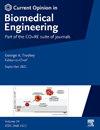燃料、形态和记忆:癌细胞的运动驱动之旅
IF 4.2
3区 工程技术
Q2 ENGINEERING, BIOMEDICAL
引用次数: 0
摘要
肿瘤进展是一个复杂的多阶段过程,包括肿瘤形成、癌细胞侵袭、转移和远处定植。每个阶段都部分由细胞运动和癌细胞与其周围微环境之间的相互作用驱动。在这篇综述中,我们描述了细胞运动如何促进癌症进展的各个阶段,重点是细胞代谢、核力学和机械记忆。总之,我们强调癌细胞在转移级联过程中移动和适应的机制。了解癌细胞如何迁移可以为破坏转移和改善癌症治疗结果的新方法提供有价值的见解。本文章由计算机程序翻译,如有差异,请以英文原文为准。
Fuel, form, and memory: The motility-driven journey of cancer cells
Tumor progression is a complex, multi-stage process that involves tumor formation, cancer cell invasion, metastasis, and colonization of distant sites. Each stage is driven in part by cell motility and interactions between cancer cells and their surrounding microenvironment. In this review, we describe how cell motility contributes to each stage of cancer progression, with a focus on cell metabolism, nuclear mechanics, and mechanical memory. Throughout, we highlight the mechanisms used by cancer cells to move and adapt during the metastatic cascade. Understanding how cancer cells migrate can provide valuable insights into novel approaches to disrupt metastasis and improve outcomes of cancer treatments.
求助全文
通过发布文献求助,成功后即可免费获取论文全文。
去求助
来源期刊

Current Opinion in Biomedical Engineering
Medicine-Medicine (miscellaneous)
CiteScore
8.60
自引率
2.60%
发文量
59
 求助内容:
求助内容: 应助结果提醒方式:
应助结果提醒方式:


